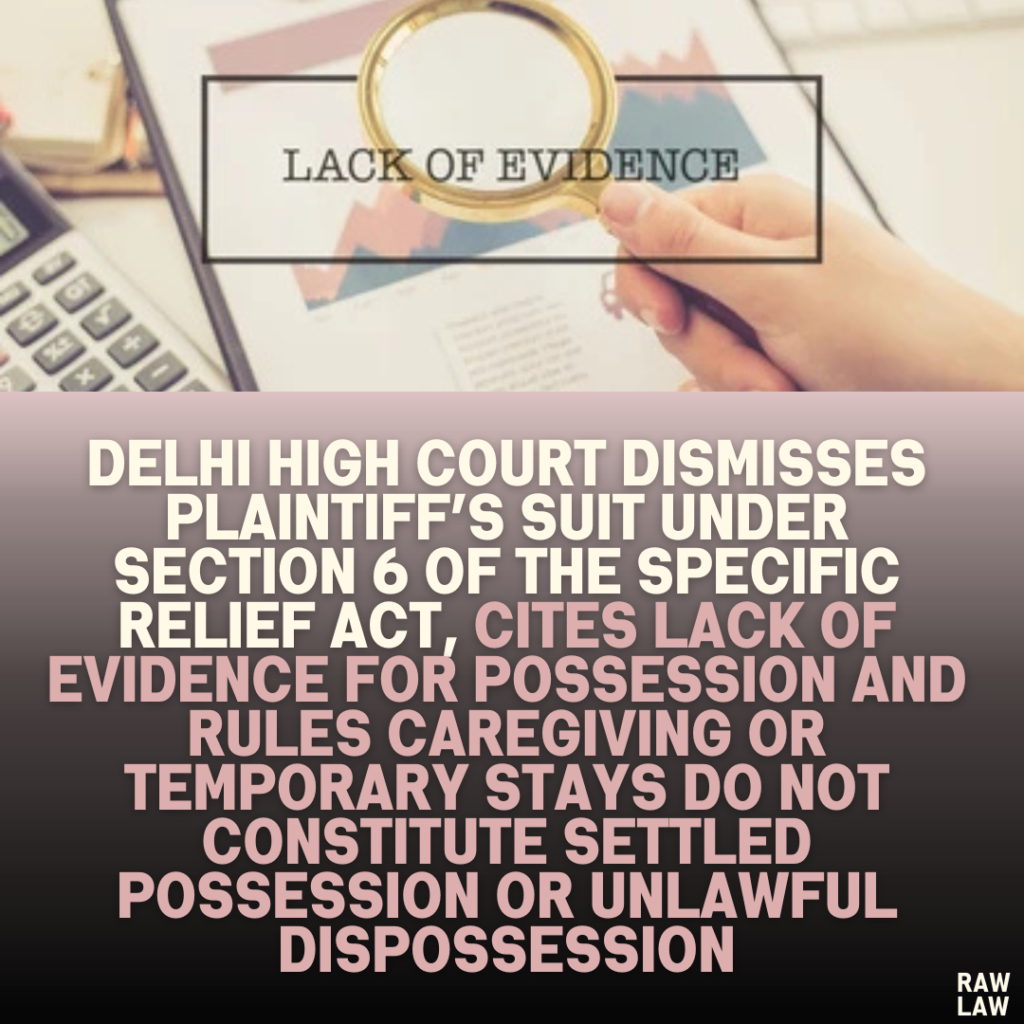Court’s Decision
The Delhi High Court overturned the trial court’s decision that granted possession of the disputed property to the plaintiff under Section 6 of the Specific Relief Act, 1963. The court ruled that:
- The plaintiff failed to establish her settled possession over the disputed property.
- There was no proof of unlawful dispossession by the defendant. As a result, the suit filed by the plaintiff was dismissed.
Facts
- The Property:
- The suit property was owned by the late Smt. Shanti Rani Gupta and comprised two rooms on the ground floor, along with other portions of the house in Shakarpur, Delhi.
- Smt. Gupta passed away childless, leaving behind a disputed Will that allegedly divided her property equally among three heirs.
- The Plaintiff’s Claim:
- The plaintiff claimed she lived with Smt. Gupta in the property from 2012 until Smt. Gupta’s death in 2017.
- She argued that she moved in to care for Smt. Gupta in her old age.
- After Smt. Gupta’s death, the plaintiff alleged that the defendant, a legal heir, forcibly dispossessed her by locking the two rooms on the ground floor.
- The Defendant’s Counter-Claim:
- The defendant argued that he was also a legal heir to the property and took possession of the rooms only after Smt. Gupta’s demise.
- He denied that the plaintiff was ever in settled possession of the disputed portion.
- He claimed that any temporary care provided by the plaintiff did not amount to legal possession.
Issues
- Was the plaintiff in settled possession of the property at the time of the alleged dispossession?
- Did the defendant unlawfully dispossess the plaintiff?
- Does the plaintiff have a valid claim under Section 6 of the Specific Relief Act?
Petitioner’s Arguments (Defendant)
- Lack of Settled Possession:
- The defendant argued that the plaintiff had no documentary proof of her possession over the two rooms on the ground floor.
- Temporary stays to care for the deceased could not constitute settled possession.
- No Evidence of Dispossession:
- The plaintiff admitted that she was not physically present in the disputed portion at the time of the defendant’s alleged entry.
- The defendant, as a legal heir, had the right to access and occupy the property after Smt. Gupta’s death.
- Deficiencies in Plaintiff’s Evidence:
- The plaintiff’s documents (e.g., voter ID and correspondence) did not conclusively establish her possession of the ground-floor rooms.
- The trial court erred in assuming possession based on weak evidence.
Respondent’s Arguments (Plaintiff)
- Settled Possession:
- The plaintiff claimed she had lived with Smt. Gupta in the disputed rooms from 2012 until 2017.
- She presented voter ID and correspondence addressed to her at the property as proof of her residence.
- Unlawful Dispossession:
- The plaintiff argued that after Smt. Gupta’s death, the defendant locked the rooms and refused to hand over possession, effectively dispossessing her without following legal procedures.
- Right to Restoration of Possession:
- Under Section 6 of the Specific Relief Act, the plaintiff argued that she was entitled to restoration of possession regardless of the defendant’s claim of ownership.
Analysis of the Law
- Section 6 of the Specific Relief Act:
- Section 6 protects individuals from being dispossessed without due process, regardless of ownership or title.
- To succeed under Section 6, a plaintiff must prove:
- Settled possession of the property.
- Unlawful dispossession by the defendant.
- Key Requirements:
- Settled Possession: Possession that is continuous, peaceful, and undisputed for a reasonable period.
- Unlawful Dispossession: Entry or takeover without legal authority or following due process.
- Application in This Case:
- The court found that the plaintiff failed to prove settled possession. Occasional stays to care for the deceased did not amount to continuous possession.
- There was no evidence that the defendant’s entry into the property was unlawful, especially since he was a legal heir.
Precedent Analysis
- The court referred to prior judgments emphasizing that claims under Section 6 require:
- Substantive proof of possession.
- Evidence of unlawful dispossession.
- The court highlighted that possession cannot be presumed based on weak or circumstantial evidence.
Court’s Reasoning
- Lack of Evidence for Possession:
- The plaintiff’s own testimony confirmed that the disputed rooms were in the exclusive possession of Smt. Gupta until her death.
- Documents submitted by the plaintiff (voter ID, correspondence) were insufficient to establish settled possession.
- No Unlawful Dispossession:
- The defendant’s act of locking the rooms after Smt. Gupta’s death did not constitute unlawful dispossession since the plaintiff was not physically present or in joint possession of those rooms.
- Flawed Trial Court Decision:
- The trial court wrongly assumed possession without substantive evidence.
- The burden of proof rested on the plaintiff, who failed to discharge it.
Conclusion
- The High Court set aside the trial court’s judgment and dismissed the plaintiff’s suit.
- The court ruled that the plaintiff could not prove her claim under Section 6 of the Specific Relief Act.
Implications
- This judgment underscores the importance of proving settled possession in disputes under Section 6 of the Specific Relief Act.
- It clarifies that mere caregiving or occasional stays do not amount to possession.
- The case reinforces that legal heirs are entitled to access property after the owner’s demise unless proven otherwise.



